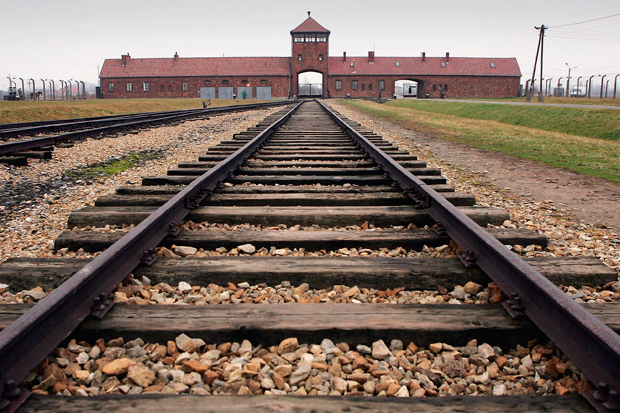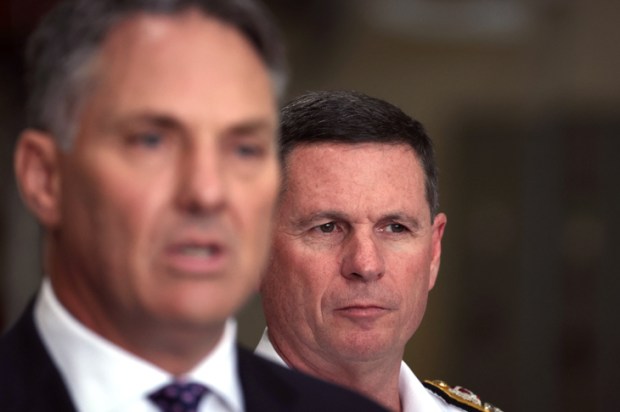An emaciated figure in Auschwitz’s prison rags stands across a desk from a tall, thin, blond German named Doktor Pannwitz. From his office, Pannwitz can dispense life or death.
As the prisoner pleads his case, he fears leaving ‘a dirty stain’ on whatever he touches. Pannwitz looks at the prisoner ‘as if across the glass window of an aquarium between two beings who live in different worlds’. For Primo Levi, recounting this memory in If this is a Man, selectively denying the humanity of certain groups was ‘the essence of the great insanity’ of the Third Reich.
The Allies’ victory in the Second World War and the liberation of the remaining concentration camp survivors repudiated that worldview. Then, with the guns falling silent, the world recognised a need to articulate a new, positive vision of human relations where the protection of individual dignity is paramount. This started in 1948 with the drafting of the Universal Declaration of Human Rights – the first of the major international human rights instruments.
But how does this all apply to the problems of a modern liberal democracy like Australia?
Looking at the Holocaust is like looking at the sun. The Holocaust radiates so intensely that we can be blinded by the encounter. Our problems, important on their own terms, look petty when seen in the shadow of the apotheosis of evil.
But Levi’s body of work insists that the Holocaust illuminates important truths about human relations. Levi’s account not only refutes the lie that he is a mere ‘zoological specimen’, it refutes the entire mode of thinking on which that perception was based. And so – carefully, sensitively – we have a duty to make sure ours is a community that sees and respects the humanity in all its members.
In August, I started as Human Rights Commissioner. I’m grateful to do so in Australia and not some other parts of the world. We should celebrate that Australia is a stable liberal democracy; that the vast majority of our laws and institutions are benign and humane; that we have an egalitarian culture, founded on the ‘fair go’. This isn’t jingoism. It’s about recognising time-tested and valuable features of the Australian way of life, so that we can preserve and protect them.
At the same time, my role also involves identifying practical human rights problems. Before starting at the Human Rights Commission, I worked in a public interest legal practice, representing people on the margins.
Many of our clients were prisoners. There was Joanne, who has a mild intellectual disability and was convicted of a minor criminal offence. The magistrate ordered that she attend a secure unit for psychological assessment. Joanne was subsequently detained, against her will and against the express wishes of the Office of the Public Guardian, for six-and-a-half years – her ‘assessment’ lasted far longer than any conceivable criminal sentence for this sort of offence.
We represented the family of Stephen, who had a heart attack in a prison van. The prison officers failed to seek medical attention, notwithstanding Stephen’s increasingly desperate screams and those of the other prisoners in the back of the van. Even when the officers stopped – at a hospital – to ask for directions, they failed to seek medical attention. When they reached their destination, Stephen was dead.
Another case was an inquest into Tracy-Lee’s heroin overdose in prison. Tracy-Lee was being held in the prison’s ‘high needs’ unit whose aim was to protect prisoners at risk of overdosing. Yet she was able to obtain drugs and was left, as per prison policy, for long periods of time without being checked.
What links these cases is not a malign individual or government policy aiming to violate these people’s basic rights. Unlike Pannwitz, we don’t gaze malevolently on people like Joanne, Stephen and Tracy-Lee; we tend not to gaze on them at all – or at least not enough.
So what is the solution? Sadly, there’s no simple answer. But here’s a start. First, we lock up too many people in Australia. In the US, which has gone down a similar road to the one we’re on, there are over 2.2 million adults in prison. In the US, conservative voices like Newt Gingrich have taken the lead in identifying the counter-productive impact of high incarceration, and are pushing to reverse the ever-increasing growth in the prison population. If we understand better what causes people to be sucked into the criminal justice vortex, and we seek to address those causes, we’re more likely to build a safe and more harmonious community.
Secondly, to paraphrase Dostoevsky, a society’s civilisation can be judged by entering its prisons. Australia lacks a coordinated, systematic process for inspecting and monitoring places of detention. Almost every country Australia compares itself to has just such a system, by implementing the Optional Protocol to the Convention Against Torture (OPCAT).
OPCAT doesn’t create new rights. Its main impact is to enable an independent Australian inspection body to visit places where people are detained and identify problems before they metastasise.
Take, for example, the use of spit hoods on young people held in the Don Dale Youth Detention Centre. If Australia had implemented OPCAT, Australian inspectors could have worked constructively with the Centre and the Northern Territory Government to address the root problem (the spread of disease) in a way that was less likely to jeopardise the young detainees’ basic dignity.
We should be clear eyed about the nature and extent of Australia’s human rights problems. It should go without saying that equating those problems with the Holocaust is offensive and wrong.
But nor can we dismiss these problems, or the people who embody them. Human rights – as a body of law, a set of principles and a lens through which to view the world – rarely provides a definitive, black-and-white answer to the complex and nuanced social issues that arise in a liberal democracy like Australia. Instead, it can provide something more subtle but also more valuable – a means to accommodate competing rights and interests while preserving the centrality of individual dignity.
The post In defence of human rights appeared first on The Spectator.
Got something to add? Join the discussion and comment below.
Get 10 issues for just $10
Subscribe to The Spectator Australia today for the next 10 magazine issues, plus full online access, for just $10.
You might disagree with half of it, but you’ll enjoy reading all of it. Try your first month for free, then just $2 a week for the remainder of your first year.














Comments
Don't miss out
Join the conversation with other Spectator Australia readers. Subscribe to leave a comment.
SUBSCRIBEAlready a subscriber? Log in